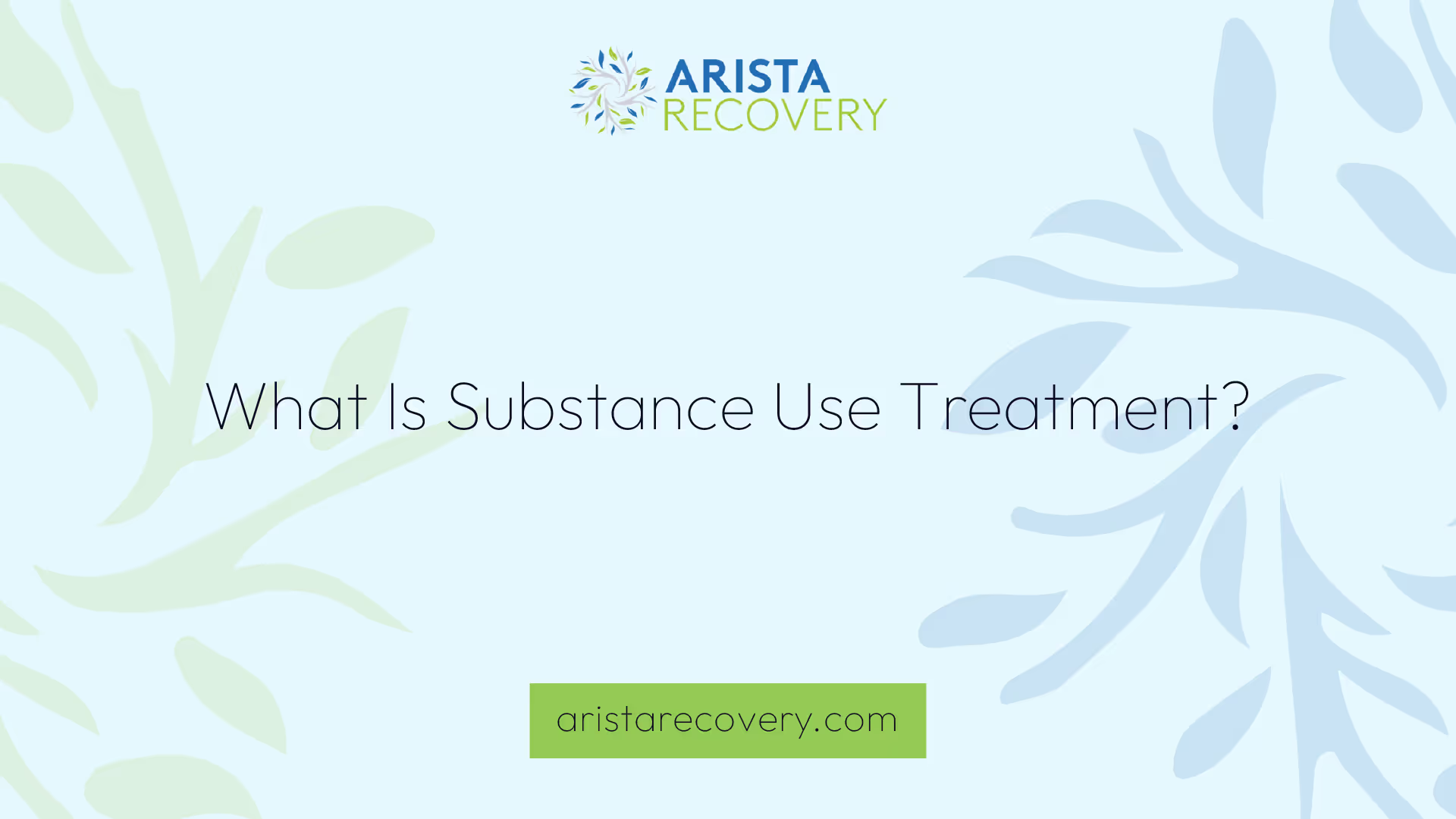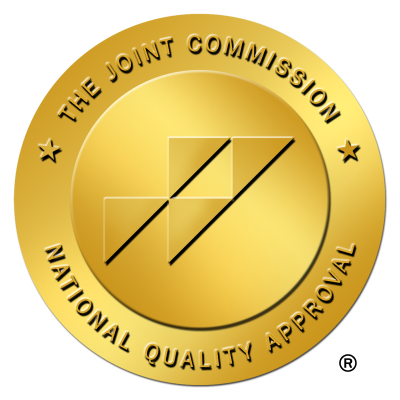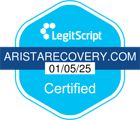What Is Substance Use Treatment?

Understanding Substance Use Treatment
To delve into the realm of substance use treatment, it is crucial to first establish a clear understanding of what it entails and its primary objectives. This foundational knowledge provides a basis for exploring various facets of treatment and their relevance to individuals seeking help.

Defining Substance Use Treatment
Substance use treatment involves the process of helping individuals recover from substance use disorders, which can include alcohol and drug addiction. Treatment can take place in a variety of settings, ranging from inpatient treatment centers to outpatient programs and individual therapy sessions. The choice of setting typically depends on the individual's needs and the extent of their substance use disorder American Addiction Centers.
These treatments are designed to address not just the substance use but also the underlying causes and associated issues. This comprehensive approach ensures that individuals receive the support they need to overcome their addiction and move towards a healthier and more fulfilling life.
Goals of Treatment
The primary goal of substance use treatment is to assist individuals in stopping the use of substances, remaining substance-free, and leading healthier and more fulfilling lives. However, it's important to note that the specific treatment approaches may vary based on the individual's needs and the severity of their substance use disorder American Addiction Centers.
Moreover, complete abstinence is not always the sole focus in substance use treatment. Improvement in the quality of life, reduced criminal activity, and enhanced occupational and social functioning are also considered significant measures of success Addiction Rehab Centers.
To summarize, the essence of substance use treatment lies in its holistic approach to recovery. It aims to address the root causes of addiction, facilitate cessation of substance use, and equip individuals with the tools they need to overcome challenges and lead fulfilling lives. The subsequent sections will delve deeper into the various components of effective treatment, types of treatment, and strategies for personalizing treatment to suit individual needs.
Components of Effective Treatment
Substance use treatment is a complex process that involves various components to effectively address the multifaceted nature of addiction. These components work together to provide a comprehensive approach to treatment, addressing not only the physical aspects of addiction but also the psychological and social factors that contribute to substance use disorders.
Addressing Multiple Needs
Effective substance use treatment must cater to the multiple needs of individuals, not just their drug use. This includes addressing mental health issues, medical conditions, and social problems that may be contributing to their substance use or hindering their recovery [1].
Often, individuals dealing with substance use disorders also struggle with co-occurring mental health conditions, such as anxiety, depression, or post-traumatic stress disorder. Therefore, an effective treatment program must also provide mental health services, including therapy and medication management.
Similarly, substance use can also lead to a range of medical issues, from physical withdrawal symptoms to chronic health conditions. These medical needs must also be addressed as part of a comprehensive treatment plan.
Moreover, social factors, such as housing instability, unemployment, or strained relationships, can contribute to substance use and make recovery more challenging. Therefore, effective treatment programs also provide support and resources to address these social issues.
Use of Evidence-Based Approaches
Evidence-based approaches form the cornerstone of effective substance use treatment. These are treatments that have been scientifically tested and proven to be effective in helping individuals overcome their substance use disorders.
Such approaches often include behavioral therapies, counseling, medication-assisted treatment, support groups, and other complementary methods. Each of these approaches plays a crucial role in addressing the biological, psychological, and social aspects of addiction [2].
Behavioral therapies and counseling, for example, help individuals develop healthier coping mechanisms, improve their relationships, and make positive changes in their lives. Medication-assisted treatment can help manage withdrawal symptoms, reduce cravings, or treat co-occurring mental health conditions. Support groups provide a safe and supportive community where individuals can share their experiences and learn from others who are also on the path to recovery.
Importance of Treatment Availability
Availability of treatment is another key component of effective substance use treatment. Individuals struggling with substance use disorders should be able to access treatment services when they need them [1].
This includes not only having treatment facilities within reach but also having a range of treatment options available to cater to the diverse needs and preferences of individuals. For some, this may mean inpatient treatment programs that provide intensive care and a structured environment. For others, outpatient programs that allow them to continue with their daily activities while receiving treatment may be more suitable.
In addition to traditional treatment methods, effective substance use treatment also includes preventive measures, regular screening, brief interventions for emerging substance use, and treatment referrals for more advanced substance use.
By ensuring the availability of a broad range of treatment options, individuals can receive the care they need in a manner that best fits their lifestyle, preferences, and recovery goals.
Types of Substance Use Treatment
Substance use treatment involves the process of helping individuals recover from substance use disorders, which can include alcohol and drug addiction. Treatment can take place in a variety of settings, such as inpatient treatment centers, outpatient programs, or individual therapy sessions [2]. This section will explore these different types of treatments.
Inpatient and Outpatient Treatment
Inpatient and outpatient treatments are two of the most common types of substance use treatments. The major difference between these two lies in the location where the treatment takes place. Inpatient treatment, also known as residential treatment, involves the patient living at the treatment facility throughout the duration of the program. On the other hand, outpatient treatment allows the patient to live at home and attend treatment sessions at the facility.
There are various types of addiction treatment programs available, including Outpatient, Intensive Outpatient Program (IOP), Partial Hospitalization Program (PHP), Residential (rehab), and Inpatient. These programs differ in intensity and setting, from low to high intensity and from living at home to residing in a residential facility [4].
Individual Therapy Sessions
Individual therapy sessions are another vital component of substance use treatment. These sessions allow for one-on-one interaction between the patient and the therapist, providing a safe and confidential space for the patient to discuss their struggles with substance use. The therapist can provide personalized strategies and techniques to help the patient manage their substance use and cope with any underlying issues, such as mental health disorders or past trauma.
Medication-Assisted Treatment
Medication-assisted treatment (MAT) is a form of substance use treatment that involves the use of medications, in combination with counseling and behavioral therapies, to provide a holistic approach to recovery. MAT is primarily used for the treatment of addiction to opioids such as heroin and prescription pain relievers, but it can also be used in the treatment of alcohol and nicotine addiction.
Medications for Addiction Treatment (MAT) are available for individuals with physical dependencies on substances like alcohol, nicotine, and opioids. These medications are often used in combination with counseling and other treatment services [4].
Substance use treatment services should be readily available, address the multiple needs of the individual, and should be evidence-based to provide the best chance for success. Utilizing a combination of these treatments, tailored to the specific needs of the individual, can provide an effective approach towards recovery.
Personalizing Substance Use Treatment
A crucial aspect of substance use treatment is recognizing the unique needs and circumstances of each individual. Personalized treatment plans, tailored to the individual's specific needs, preferences, and recovery goals, can significantly enhance the effectiveness of the treatment.
Tailoring Treatment to Individual Needs
Substance use treatment services should be readily available and address the multiple needs of the individual to provide the best chance for success. According to American Addiction Centers, individuals seeking substance use treatment can benefit from personalized treatment plans tailored to their unique needs, preferences, and recovery goals.
A comprehensive treatment plan often includes a combination of therapies and supportive services to address all aspects of the individual's addiction. This includes not only physical issues directly related to substance use but also psychological, emotional, and social issues that may have contributed to or resulted from the addiction.
For instance, treatment for substance use disorder can take place in different settings such as inpatient or outpatient, with varying degrees of intensity. Medications for opioid use disorders are also included in treatment plans.(Drug Free)
Substance abuse treatment professionals use a variety of group treatment models, including psychoeducational groups, skills development groups, cognitive-behavioral/problem-solving groups, support groups, and interpersonal process groups. Each model offers different therapeutic experiences for group members, allowing for a more tailored approach to treatment. (NCBI Bookshelf)
Continuous Monitoring and Modification
In the journey of recovery, an individual's needs and progress can change over time. Therefore, continuous monitoring and modification of substance use treatment plans are important. This approach matches the changing needs and progress of the individual and maximizes the chances of success in recovery [1].
This process involves regular assessment of the individual's progress towards their recovery goals, as well as any new challenges or changes in their circumstances. Adjustments to the treatment plan, such as changes in therapy types, medication doses, or supportive services, can be made based on these assessments. This continuous cycle of assessment and adjustment ensures that the treatment plan remains relevant and effective throughout the individual's recovery journey.
In conclusion, personalizing substance use treatment is crucial to its success. By tailoring treatment plans to the individual's unique needs and continuously monitoring and modifying these plans, treatment providers can greatly enhance the effectiveness of substance use treatment.
The Role of Peer Support
Peer support plays a crucial role in the journey towards recovery from substance use disorders. It involves giving and receiving nonprofessional, nonclinical assistance from individuals with similar conditions or circumstances to achieve long-term recovery [5]. This section will explore the benefits of peer support groups and their role in recovery.
Benefits of Peer Support Groups
Peer support groups are a key component of many existing addiction treatment and recovery approaches. These groups have demonstrated associated benefits in substance use, treatment engagement, HIV/HCV risk behaviors, and secondary substance-related behaviors such as craving and self-efficacy [5].
Through shared experiences, peer support groups can offer emotional, social, and practical help to individuals struggling with substance use disorders. They can foster a sense of belonging, reduce feelings of isolation, and provide an environment where individuals can learn from each other's experiences.
Moreover, peer support groups have shown positive outcomes in terms of active engagement, recovery, and increased self-esteem and coping abilities for both participants and facilitators [5].
Role of Peer Support in Recovery
Peer support groups are considered an important aspect of the addiction recovery process. They provide a platform for individuals to share their experiences, challenges, and successes, fostering a supportive community that encourages and motivates its members towards recovery.
Furthermore, peer support groups can play a significant role in maintaining recovery and preventing relapses. The shared understanding and mutual support offered in these groups can provide the strength and resilience needed to overcome setbacks and stay committed to the recovery journey.
However, while peer support groups included in addiction treatment show promise, more rigorous research is needed in this area. The limited data relevant to this topic diminish the ability to draw definitive conclusions.
In conclusion, peer support serves as a potent tool in substance use treatment, offering emotional and practical support that enhances the effectiveness of professional treatment methods. By investing in peer support, individuals can empower themselves and others to embark on a successful recovery journey.
Evaluating Treatment Effectiveness
In the journey to overcoming substance use, understanding the effectiveness of treatment is crucial. This involves examining measures of success and implementing quality assurance to ensure the provision of optimal care.
Measures of Success
Success in substance use treatment is multi-dimensional and can be evaluated based on a range of factors. Some of these include improvement in quality of life, reduced criminal activity, and improved occupational and social functioning. These measures provide a comprehensive view of an individual's progress and recovery.
It's important to focus on the functional status of patients during treatment rather than after treatment has stopped, similar to approaches used for other chronic illnesses.
Performance Measures and Quality Assurance
Performance measures for alcohol and other drug services play a vital role in improving access to treatment and the quality of care. The Washington Circle measures, for example, are a widely used set of performance measures.
The Continuum-of-Care framework allows for the identification of needs at different stages of alcohol and other drug disorders. Performance measures should be developed and used at each stage of care for optimal patient care.
Quality measures for alcohol and other drug services can be categorized as structural, process, outcomes, access, and patient experience measures. These measures assess the capacity of a healthcare organization, adherence to clinical practice recommendations, patient health resulting from services, extent of care received, and patient satisfaction, respectively.
With these measures, treatment providers can ensure that their services are effective, accessible, and meet the needs of those seeking help for substance use disorders. Understanding what is substance use treatment and its effectiveness is not just about immediate results, but also involves the long-term outcome and improvement in the patient's overall quality of life.
Challenges and Future Directions
Despite the advances in the field, substance use treatment still faces a myriad of challenges that need to be addressed. Among them are the chronic nature of addiction and the need for more accessible treatment options.
Addressing the Chronic Nature of Addiction
Substance addiction is a chronic, relapsing condition, often requiring long-term management and support. The Western approach to drug abuse treatment involves a medical or disease orientation with a clinical goal of abstinence or significant reductions in drug use. However, there is a significant mismatch between the accepted nature of addiction as a disease and how it is actually treated [3].
Continuing care and adaptive treatment protocols show promise in addressing the chronic, relapsing, and heterogeneous nature of most cases of serious addiction. These protocols combine behavioral therapies, family and social supports, and medications. Prevention, regular screening, brief interventions for emerging substance use, and treatment referral for more advanced substance use should be part of a broad healthcare policy to prevent, detect, and address early cases of substance abuse disorders [3].
Need for More Accessible Treatment Options
The field of substance use treatment needs to offer more treatment options, with greater accessibility and attractiveness. Patients often do not respond adequately to the first treatment offered and may have different preferences and needs. For example, The Sinclair method is a treatment for alcohol use disorder that focuses on reducing use rather than complete abstinence and can be considered for individuals struggling with alcohol use [4].
Different types of addiction treatment programs are available, including outpatient, intensive outpatient programs (IOP), partial hospitalization programs (PHP), residential (rehab), and inpatient. These programs differ in intensity and setting, from low to high intensity and from living at home to residing in a residential facility.
Medications for Addiction Treatment (MAT) are available for individuals with physical dependencies on substances like alcohol, nicotine, and opioids. These medications are often used in combination with counseling and other treatment services [4].
Continued care, or aftercare, is crucial post-treatment to ensure that the tools learned during treatment can be effectively applied in the real world. Recovery support options include recovery or sober houses, sober dorms, recovery high schools, and recovery support groups like Alcoholics Anonymous and Narcotics Anonymous.
In conclusion, while progress has been made in the field of substance use treatment, much work remains. Future directions should focus on addressing the chronic nature of addiction and making treatment more accessible to all who need it.
References
[1]: https://addictionrehabcenters.com/measuring-success-in-addiction-treatment/
[2]: https://americanaddictioncenters.org/therapy-treatment
[3]: https://www.ncbi.nlm.nih.gov/pmc/articles/PMC3375602/
[4]: https://drugfree.org/article/types-of-addiction-treatment/


